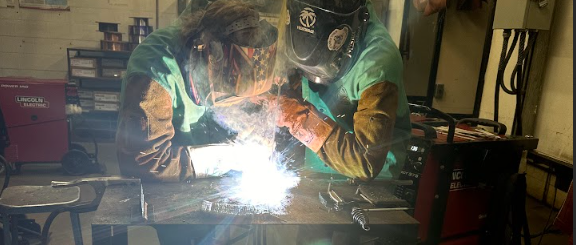
Welding Technology
Year 1
This course is offered to both juniors and seniors. Students in this program are prepared to set-up and pass a qualification test according to the American Welding Society. Students in the first year will also receive a basic introduction to machining.
Year 2
This course is offered to seniors that have successfully completed the first year program. Second year students will learn advanced arc welding, which prepares them for welding pipe and passing a qualification test using shielded metal arc welding. Students will also learn gas tungsten arc welding as well as receive an introduction to blueprint reading for welders and metallurgy. Welding is taught through lectures and hands-on experiences. Common sense and safety are important qualities for students interested in welding.
Program Overview
Course Information
Program Location
LCC West Campus
Session Offered
AM.PM
Average Lecture days/week
0-1 days
Average Lab days/week
4-5 days
Homework
Rarely
Required Reading
- College level textbooks
- Less than 25 pages a week
Success Indicator
- Focused
- Excellent attendance
- Able to stand two hours
- Heavy lifting
- Good hand/eye coordination
- Detail oriented
- Hardworking
- Respectful
- Quiet
- Willing to learn
- Trainable
- Understand measurements
College Credits - 18
Year 1
- TECH 100 - Industrial Safety
- WELD 103 - Combination Welding
- WELD 110 - Gas Metal Arc Welding
Year 2
- WELD 105 - Advanced Welding
- WELD 111 - Gas Tungsten Arc Welding
Academic Rigor
2 out of 5
Capital Region Technical Early College
Students enrolled in this program may choose to participate in the Capital Region Technical Early College program. It is a high school-to-college program where students start in grade 11 and leave in grade 13 with a college degree or certification. The program gives students relevant career-related experiences.
Course Outcomes
Students learning outcomes include, but are not limited to:
- Oxygen and acetylene use and safety factors
- Evaluating the likeness and differences between oxidizing and neutral can carburizing flames
- Troubleshooting welding equipment malfunctions
- Understanding and using various welding terms and descriptions
- Understanding the steel designation system
- Fundamentals of alternating current and direct current as well as the application and principles of polarity
- Determine the correct amperage and voltage used and the variables of amperage for the different material thickness
- Basic knowledge in gas metal arc welding and flux cored arc welding
- Understanding the major transfers of wire, including short circuit, spray, globular and pulsed
- Discussing position groove welds, both open root and closed root (with backer plates)
Certifications
- Lansing Community College Certificate of Completion
- OSHA 10
- First AID/CPR
Student Leadership
Students have the opportunity for leadership, competition and community service through membership in SkillsUSA.
Career Outlook
Careers
- Welder/Solder/Cutter/Brazer
- Sheet Metal Worker
- Master Jeweler
- Fabricator
- Oil Rig Welder
Median Wage
- Welder/Solder/Cutter/Brazer: $23.53 Hourly, $48,940 Annually
- Sheet Metal Worker: $28.26 Hourly, $58,780 Annually
- Master Jeweler: $22.06 Hourly, $, $52,500 Annually
- Fabricator: $22.52 Hourly, $53,175 Annually
- Oil Rig Welder: $24.88 Hourly, $57,766 Annually
Employment Outlook (Average)
- Welder/Solder/Cutter/Brazer: 5-9%
- Sheet Metal Worker: 5-9%
- Master Jeweler: 2-4%
- Fabricator: 1-5%
- Oil Rig Welder: 2%

